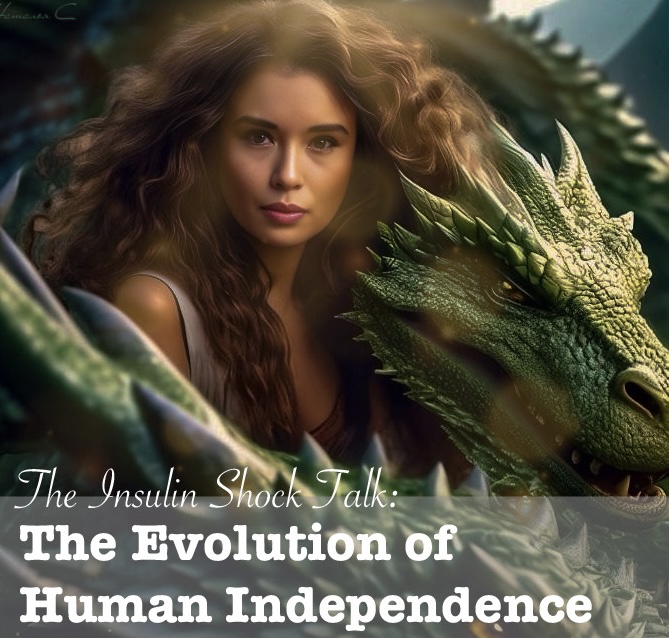
Last night, a seemingly simple question about my blood sugar levels jolted me. It transported me back to a pivotal moment, a moment when I faced an insulin shock and fought for my life all alone, desperately dialing for an ambulance. The voice of the paramedic over the phone acted like an alarm clock, urging me to stay alive. Even today, recalling that moment brings tears, as I quietly reassured myself, “Not today, Suzette, not yet.”
Recovery from the insulin shock was a silent battle, an ordeal where I navigated struggles, fear, and tears without anyone knowing the depth of the challenge. It was a solitary journey that many endure, facing unseen battles, forging strength in the shadows.
Beneath the surface of adversity lay triumphs hidden from the world. Emerging from the ordeal, I discovered a reservoir of joy and a newfound love for life. The experience became a catalyst for personal growth, turning the scars of struggle into markers of resilience.
The aftermath of this transformative experience revealed a paradox within me. While adept at caring for others without expecting reciprocation, the surprising revelation was the difficulty in accepting care myself. This paradox initiated profound reflection on the evolution of human independence – a complex dance between self-sufficiency, resilience, and the delicate balance of solitude and connection.
Books Illuminating the Path:
- “The Power of Habit” by Charles Duhigg: Charles Duhigg delves into the intricacies of habits and how they shape our lives. In the context of post-insulin shock recovery, forming positive habits becomes not just a routine but a lifeline. For instance, developing a habit of regular check-ups and mindful self-care transforms routine tasks into anchors of independence, empowering individuals to take charge of their health.
- “Daring Greatly” by Brené Brown: Brené Brown’s exploration of vulnerability and the power of connection resonates deeply with the paradox of independence. Brown challenges the conventional notion that strength lies in invulnerability. Drawing from her insights, embracing vulnerability after an insulin shock might involve sharing one’s experience with trusted friends or family, fostering deeper connections that contribute to both personal and communal well-being.
- “When Breath Becomes Air” by Paul Kalanithi: Paul Kalanithi’s memoir is a poignant exploration of life’s fragility and the quest for meaning in the face of mortality. Although the circumstances differ, his journey and reflections provide a poignant backdrop to the exploration of life after a profound health crisis. One might find resonance in Kalanithi’s pursuit of purpose and the appreciation of life’s fleeting moments, drawing inspiration to infuse greater meaning into the evolution of personal independence.
Advantages and Disadvantages of Independence:
Advantages:
a. Personal Growth: The journey after an insulin shock often leads to profound personal growth, fostering resilience and self-awareness. Applying lessons from “The Power of Habit,” one can consciously cultivate habits that nurture personal growth and well-being.
b. Empowerment: Learning to take care of oneself brings a sense of power and self-reliance, crucial in navigating life’s challenges. “Daring Greatly” suggests that embracing vulnerability and seeking support can be a powerful step toward empowerment, allowing individuals to recognize the strength in both giving and receiving care.
c. Appreciating Life: The struggles magnify the appreciation for life, turning ordinary moments into extraordinary victories. “When Breath Becomes Air” encourages a reflective approach, urging individuals to find purpose and meaning in life’s fleeting moments, transforming the ordinary into the extraordinary.
Disadvantages:
a. Isolation: The pursuit of independence may inadvertently lead to isolation, hindering the potential for meaningful connections. Here, “Daring Greatly” serves as a guide, advocating for the courage to be vulnerable and open to connection, creating a balance between independence and communal support.
b. Hidden Struggles: Internal battles may go unnoticed, affecting mental health and well-being. “When Breath Becomes Air” prompts introspection, encouraging individuals to share their struggles and seek understanding, ensuring that hidden battles find a voice within the community.
c. Unmet Emotional Needs: A reluctance to accept care may leave emotional needs unmet, contributing to a sense of loneliness. “Daring Greatly” emphasizes the power of openness in addressing emotional needs, encouraging individuals to foster connections that nurture emotional well-being.
The Dilemma: Striking a Balance:
The insight gained from the paradox of independence raises a crucial question: is the evolution of human independence a positive or negative force? The answer, perhaps, lies in recognizing that a delicate balance is key. Independence should not be a barrier to connection but a tool for personal growth and empowerment that coexists with the beauty of shared experiences.
My journey through an insulin shock has become a lens through which we explore the broader evolution of human independence. It teaches us that while self-sufficiency and resilience matter, real strength comes from balancing personal growth with shared struggles. The good parts of becoming independent should be celebrated, but not at the cost of missing out on the richness of connecting with others. In this evolving story, human independence is a mix of personal strength and the warmth of communal support, creating a dance of its own.
